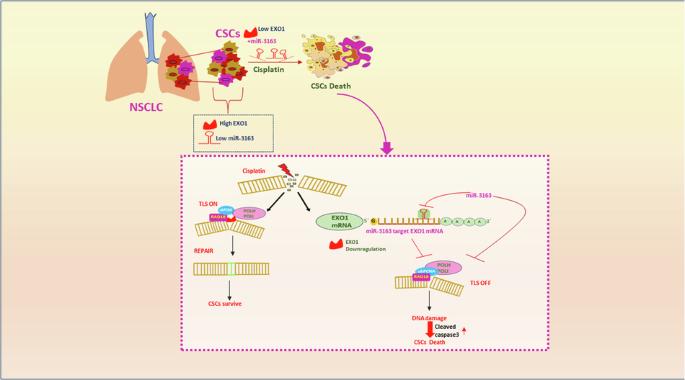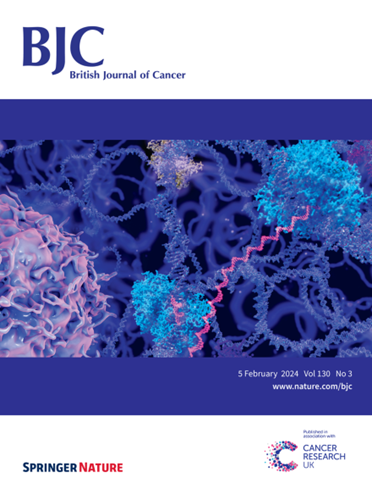EXO1/Polη/Polι轴是 miR-3163 介导的非小细胞肺癌癌症干样细胞衰减的一个有希望的靶点。
IF 6.4
1区 医学
Q1 ONCOLOGY
引用次数: 0
摘要
背景:癌症干样细胞(CSLCs)是肿瘤进展和化疗抗药性的驱动因素。EXO1和TLS聚合酶的共同努力保护了DNA的完整性,使其免受化疗药物的侵害。由于缺乏潜在的药物靶点,非小细胞肺癌(NSCLC)患者几乎没有治疗选择。目前,microRNA 为根除 CSLCs 提供了一条潜在的途径:方法:通过流式细胞术评估 EXO1 下调对 CSLCs 扩增的影响。通过共免疫沉淀和共聚焦成像验证了 EXO1、Polη 和 Polι 的共定位。在细胞系和异种移植中使用流式细胞仪和免疫组织化学方法评估了 Polη 和 Polι 共同下调对 CSLC 存活、修复合成和诱变的影响。研究了靶向 EXO1 的 MicroRNA 在 CSLCs 调控中的作用:结果:EXO1在NSCLC CSLCs中的下调会诱导DNA病变,引发细胞凋亡,并增强顺铂的敏感性。它与 Polη 和 Polι 共同参与 DNA 修复,导致 CSLCs 对顺铂产生抗性。Polη 和 Polι 的缺失会影响修复并减少顺铂诱导的突变。在异种移植中同时下调 Polη 和 Polι 可显著减少肿瘤增殖。正如机理研究所示,MiR-3163的过表达通过靶向EXO1/Polη/Polι轴使CSLC对顺铂敏感:本研究揭示了一条涉及EXO1/Polη/Polι轴和miR-3163的新型调控途径,为了解NSCLC中CSLCs的调控提供了见解。miR-3163靶向EXO1/Polη/Polι轴,从而抑制NSCLC CSLCs的细胞生长并诱导细胞凋亡。本文章由计算机程序翻译,如有差异,请以英文原文为准。

The EXO1/Polη/Polι axis as a promising target for miR-3163-mediated attenuation of cancer stem-like cells in non-small cell lung carcinoma
Cancer stem-like cells (CSLCs) drive tumour progression and chemoresistance. The concerted efforts of EXO1 and TLS polymerases safeguard DNA integrity against chemotherapeutic drugs. In absence of potential drug targets, non-small cell lung carcinoma (NSCLC) patients have few therapeutic options. In current scenario, microRNAs offer a potential avenue for eradicating CSLCs. EXO1 downregulation impact on CSLCs expansion was assessed via flow cytometry. Co-localisation of EXO1, Polη and Polι was validated through co-immunoprecipitation and confocal-imaging. The effects of co-downregulation of Polη and Polι on CSLC survival, repair synthesis, and mutagenesis were evaluated using flow cytometry and immunohistochemistry in cell lines and xenografts. MicroRNA targeting EXO1 was studied for its role in CSLCs regulation. EXO1 downregulation in NSCLC CSLCs induces DNA lesions, triggering apoptosis and enhances cisplatin sensitivity. It collaborates with Polη and Polι in DNA repair, contributing to cisplatin resistance in CSLCs. Absence of Polη and Polι impairs repair and reduces cisplatin-induced mutagenesis. Co-downregulation of Polη and Polι in xenografts reduces tumour proliferation significantly. MiR-3163 overexpression sensitises CSLCs to cisplatin via targeting EXO1/Polη/Polι axis, as shown in mechanistic studies. This study unveils a novel regulatory pathway involving EXO1/Polη/Polι axis and miR-3163, providing insights into CSLCs regulation in NSCLC.
求助全文
通过发布文献求助,成功后即可免费获取论文全文。
去求助
来源期刊

British Journal of Cancer
医学-肿瘤学
CiteScore
15.10
自引率
1.10%
发文量
383
审稿时长
6 months
期刊介绍:
The British Journal of Cancer is one of the most-cited general cancer journals, publishing significant advances in translational and clinical cancer research.It also publishes high-quality reviews and thought-provoking comment on all aspects of cancer prevention,diagnosis and treatment.
 求助内容:
求助内容: 应助结果提醒方式:
应助结果提醒方式:


